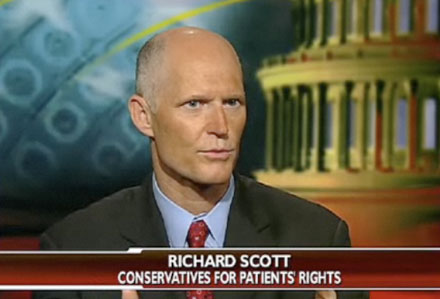The Senate race isn’t the only GOP war going on in Florida. Surprise late-entry gubernatorial candidate Rick Scott — the former CEO of the the Columbia hospital system and a leading astroturfer during the health care town halls in 2009 — is threatening to dismantle Republican party plans to replace Gov. Charlie Crist (I) with state Attorney General Bill McCollum.
Scott, a millionaire several hundred times over, jumped into GOP primary on April 13, after months of a campaign that already moved onto the general, with likely GOP nominee McCollum facing off against likely Democratic nominee and state CFO Alex Sink. But a new poll released over the weekend shows Scott has succeeded in forcing McCollum into an unexpected and costly primary fight.
Like so many Republicans these days, Scott is running as an outsider. It’s his deep pockets and connection to the conservative anti-health care reform movement from the August 2009 town halls that could be causing Florida Republicans to rethink a race they already thought was over. Now they’re left pondering if their nominee for governor might end up being a disgraced hospital executive who says he killed the public option.
It wasn’t supposed to be like this. McCollum all but cleared the GOP field last May, kicking off a long general election fight that has already seen him engage with Sink.
Scott threw a wrench into those plans with a $4.3 million ad get to know me ad campaign Scott launched after he announced his candidacy. Scott’s already spent more on the ads than McCollum has raised in the whole campaign — and he shows no sign of cutting off the cash spigot before the August primary.
The response from the McCollum campaign so far? Dismiss Scott as a well-funded eccentric carrying too much baggage to win.
“Rick Scott is a relatively unknown candidate that will have to answer some very serious questions about his history if he is to be viewed as a credible candidate,” a McCollum spokesperson told the St. Petersburg Times on Friday. (Speaking with the AP over the weekend, a McCollum spokesperson attributed the Scott surge to the fact that “the average Floridian saw Scott’s ads 40 times in the last couple weeks.”)
The McCollum team is hoping that Scott’s checkered past will stop his well-financed campaign dead in its tracks. While he was CEO of Columbia HCA, the company was forced to pay $1.7 billion in government fines after it was accused of overcharging Medicare. For his part, Scott is willing to talk about the scandal, telling the Times in an interview that “I learned hard lessons, and I’ve taken that lesson and it’s helped me become a better business person and a better leader.”
As the Times story points out, “Scott appears to differ little with McCollum on issues.” Scott is running as outsider, hoping to harness insurgent GOP anger at the party establishment to knock off McCollum.
Scott probably couldn’t have picked a better target — McCollum is about as establishment as they get.
He served in Congress from 1981-2001, racking up a House career that put him right at the top of the Republican leadership. After that, McCollum lost two successive campaigns for U.S. Senate in 2000 and 2004. In 2006, he finally found the job Floridians wanted him in, winning his current Attorney General job.
Scott, meanwhile, has a connection to the party insurgency that would be the envy of many Republicans. As the fight for a public option heated up in the health care reform debate, Scott spent $5 million on the Conservatives for Patient Rights campaign, which ran ads and funded efforts to get protesters to Congressional town hall meetings across the country. On his website, Scott touts the experience, claiming “CPR successfully led the charge to stop the government-run public option plan.”
McCollum is far from deep trouble yet — though the new Mason-Dixon poll shows Scott has made significant progress in the primary, McCollum still beat him by a margin of 38-24 (a third GOP candidate, state Sen. Paula Dockery, drew 7% of the vote.)
But there are signs that the Scott campaign is coming at just the wrong time for state Republicans, who want to hang on to the governor’s mansion (or, depending on your point of view, flip it back to the GOP after Crist’s decision to leave the party.) McCollum has problems of his own already, and spending a lot of money to fight off Scott would leave him even farther behind Sink, who already has a bigger war chest. (The new Mason-Dixon poll shows Sink closing in on McCollum, who led the general election race in the last poll by the firm — taken in March — by 15 points. The new poll shows that lead has shriveled to nine, with McCollum leading by a margin of 45-36.)
So whether Scott wins the nomination or just bloodies McCollum, Democrats are probably the beneficiaries. If it’s close, Scott might spend millions on negative ads that, say, highlight McCollum’s $60,000 taxpayer-funded contract with George Rekers. Democrats would be happy to have Scott do the dirty work of bringing McCollum down. And if Scott were to somehow win, Democrats would be more than happy to take on an executive whose company defrauded the federal government in this political climate.
But Scott’s millions could cause a problem for Sink, too. The Mason-Dixon poll shows Sink leading Scott by just two points — 38-36 — suggesting that his ability to drop tens of millions of dollars on a general election campaign could give her headaches, too.









